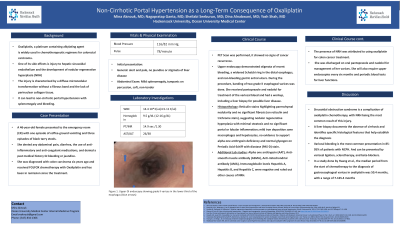Back


Poster Session B - Monday Morning
Category: Liver
B0625 - Non Cirrhotic Portal Hypertension as a Long-Term Consequence of Oxaliplatin
Monday, October 24, 2022
10:00 AM – 12:00 PM ET
Location: Crown Ballroom

Has Audio
.jpg)
Mina Aknouk, MD
Ocean University Medical Center
Brick, NJ
Presenting Author(s)
Nagapratap Ganta, MD1, Sheilabi Seeburun, MD1, Dina Alnabwani, MD2, Mina Aknouk, MD1, Yash Shah, MD1
1Hackensack Meridian Ocean Medical Center, Brick, NJ; 2Ocean University Medical Center, Brick, NJ
Introduction: Oxaliplatin, a platinum-containing alkylating drug used to treat advanced colorectal cancer, is known to cause hepatotoxicity, a rare potentially fatal long-term side effect. Here, we present a case of Non Cirrhotic Portal Hypertension caused by oxaliplatin based regimen.
Case Description/Methods: A 46 -year-old female presented to the emergency department with complaints of coffee-ground emesis, melena and one episode of syncope. No reported use of NSAIDs, excessive alcohol or anticoagulants. Past history is significant for Lynch Syndrome, adenocarcinoma of colon status post right hemicolectomy and adjuvant chemotherapy comprising leucovorin calcium(folinic acid), fluorouracil, and oxaliplatin (FOLFOX), cholecystectomy and appendectomy. Family history was significant for colon cancer in father.
She was tachycardic and hypotensive, physical examination revealed guaiac positive black stool per rectum. Lab results showed low hemoglobin of 9.5 g/dL, elevated white blood cell count of 14.4 10*3/uL, deranged coagulation profile, and elevated BUN of 38 mg/dL with normal creatinine, liver, and cardiac enzymes. Her chest x-ray was normal, contrast CT abdomen pelvis revealed significant splenomegaly. Endoscopy identified two Grade II esophageal varices status post bands, widened Schatzki ring in the distal esophagus, and benign non-bleeding gastric ulcers. Since her comprehensive liver workup came out negative, a liver biopsy was performed, demonstrating changes of nodular regenerative hyperplasia, leading to noncirrhotic portal hypertension. There is no significant portal or lobular inflammation or fibrosis, ruling out cirrhosis as a cause.
Discussion: Oxaliplatin is known to cause Nodular Regenerative Hyperplasia (NRH) leading to Non Cirrhotic Portal Hypertension (NCPH). NRH has been linked to drugs as well as rheumatoid arthritis, myeloproliferative disorder, and vasculitis. Changes of sinusoidal obstruction syndrome (SOS) and local disturbances in hepatic perfusion have been suggested as a cause of NRH in patients receiving oxaliplatin-based chemotherapy. Our patient was treated with Oxaliplatin for colon cancer, which led to the development of NRH-related NCPH, which manifested as esophageal varices associated with splenomegaly. There have been reports that Bevacizumab may help prevent NRH, which should be investigated further. More research is needed to determine the mortality differences between chemo regimens with and without Oxaliplatin.

Disclosures:
Nagapratap Ganta, MD1, Sheilabi Seeburun, MD1, Dina Alnabwani, MD2, Mina Aknouk, MD1, Yash Shah, MD1. B0625 - Non Cirrhotic Portal Hypertension as a Long-Term Consequence of Oxaliplatin, ACG 2022 Annual Scientific Meeting Abstracts. Charlotte, NC: American College of Gastroenterology.
1Hackensack Meridian Ocean Medical Center, Brick, NJ; 2Ocean University Medical Center, Brick, NJ
Introduction: Oxaliplatin, a platinum-containing alkylating drug used to treat advanced colorectal cancer, is known to cause hepatotoxicity, a rare potentially fatal long-term side effect. Here, we present a case of Non Cirrhotic Portal Hypertension caused by oxaliplatin based regimen.
Case Description/Methods: A 46 -year-old female presented to the emergency department with complaints of coffee-ground emesis, melena and one episode of syncope. No reported use of NSAIDs, excessive alcohol or anticoagulants. Past history is significant for Lynch Syndrome, adenocarcinoma of colon status post right hemicolectomy and adjuvant chemotherapy comprising leucovorin calcium(folinic acid), fluorouracil, and oxaliplatin (FOLFOX), cholecystectomy and appendectomy. Family history was significant for colon cancer in father.
She was tachycardic and hypotensive, physical examination revealed guaiac positive black stool per rectum. Lab results showed low hemoglobin of 9.5 g/dL, elevated white blood cell count of 14.4 10*3/uL, deranged coagulation profile, and elevated BUN of 38 mg/dL with normal creatinine, liver, and cardiac enzymes. Her chest x-ray was normal, contrast CT abdomen pelvis revealed significant splenomegaly. Endoscopy identified two Grade II esophageal varices status post bands, widened Schatzki ring in the distal esophagus, and benign non-bleeding gastric ulcers. Since her comprehensive liver workup came out negative, a liver biopsy was performed, demonstrating changes of nodular regenerative hyperplasia, leading to noncirrhotic portal hypertension. There is no significant portal or lobular inflammation or fibrosis, ruling out cirrhosis as a cause.
Discussion: Oxaliplatin is known to cause Nodular Regenerative Hyperplasia (NRH) leading to Non Cirrhotic Portal Hypertension (NCPH). NRH has been linked to drugs as well as rheumatoid arthritis, myeloproliferative disorder, and vasculitis. Changes of sinusoidal obstruction syndrome (SOS) and local disturbances in hepatic perfusion have been suggested as a cause of NRH in patients receiving oxaliplatin-based chemotherapy. Our patient was treated with Oxaliplatin for colon cancer, which led to the development of NRH-related NCPH, which manifested as esophageal varices associated with splenomegaly. There have been reports that Bevacizumab may help prevent NRH, which should be investigated further. More research is needed to determine the mortality differences between chemo regimens with and without Oxaliplatin.

Figure: Significant splenomegaly on CT scan
Disclosures:
Nagapratap Ganta indicated no relevant financial relationships.
Sheilabi Seeburun indicated no relevant financial relationships.
Dina Alnabwani indicated no relevant financial relationships.
Mina Aknouk indicated no relevant financial relationships.
Yash Shah indicated no relevant financial relationships.
Nagapratap Ganta, MD1, Sheilabi Seeburun, MD1, Dina Alnabwani, MD2, Mina Aknouk, MD1, Yash Shah, MD1. B0625 - Non Cirrhotic Portal Hypertension as a Long-Term Consequence of Oxaliplatin, ACG 2022 Annual Scientific Meeting Abstracts. Charlotte, NC: American College of Gastroenterology.
